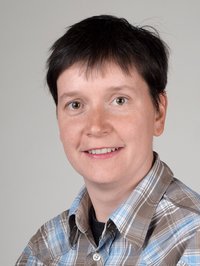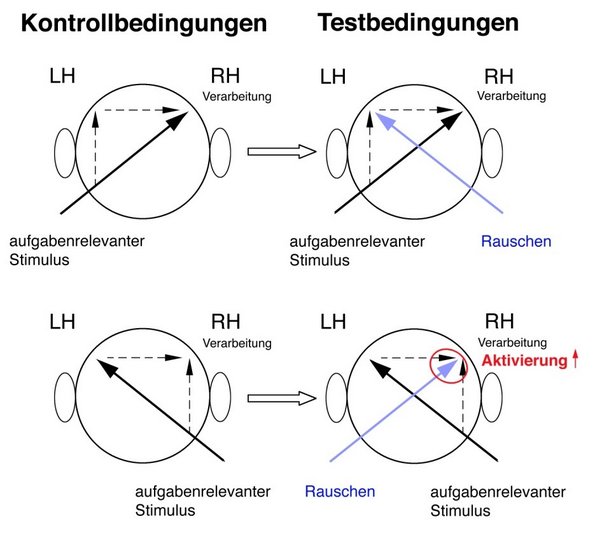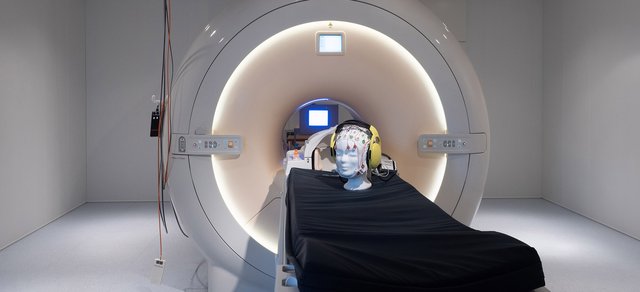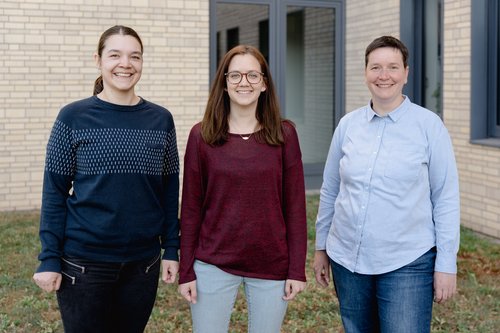Central auditory functions and dysfunctions
The main research interest of the group is lateralized auditory processing and hemispheric interaction in human auditory processing. We want to better understand deficits in central auditory processing in different groups of people (e.g., older adults, cochlear implant user) and we want to develop tools to improve hemispheric interaction on an individual level to achieve high level hearing quality and speech competence. For the investigations, we are using functional magnetic resonance imaging (fMRI), Diffusion Tensor Imaging (DTI), Electroencephalography (EEG), psychophysiological and behavioral measurements. Besides broadening the understanding of hemispheric specialization and interaction during auditory processing we transfer this knowledge into the clinics.
- Head
Head

Since 2018 Nicole Angenstein is head of the AG “Central auditory functions and dysfunctions”. She studied Biology from 1997 until 1999 at the Martin Luther University, Halle-Wittenberg and Neurobiology from 1999 until 2002 at the Otto-von-Guericke University Magdeburg. She did her PhD in the Leibniz Institute for Neurobiology and received her PhD in Neurobiology in 2009 from the Otto-von-Guericke University Magdeburg. Since 2007 she worked as researcher in different projects funded by the DFG, BMBF and the county Saxony-Anhalt. Between 2011 and 2018 she was principal investigator for the DFG projects “Hemispheric interaction during the lateralized processing of acoustic parameters in humans“ and “Hemispheric interaction during lateralized auditory processing in humans: effects of task difficulty, training and age“.
- Members
Members
Head Dr. Nicole Angenstein +49-391-6263-92182 nicole.angenstein@lin-magdeburg.de PhD students Anna Groppe +49-391-6263-92141 anna.groppe@lin-magdeburg.de Annika Michalek +49-391-6263-92141 annika.michalek@lin-magdeburg.de - Projects
Projects

The contralateral noise procedure to investigate lateralized processing in the human auditory cortex and hemispheric interaction with fMRI 
Region of the human auditory cortex that is involved in the comparison of frequency modulations 1. Lateralized auditory processing and hemispheric interaction in healthy adults
It is still not fully understood how the left and right hemisphere dynamically work together during processing of complex auditory stimuli such as speech. We use the contralateral noise procedure for the investigation of the dynamics of lateralized auditory processing and hemispheric interaction in healthy adults. This will help to better understand the processing of complex acoustic stimuli and will be the basis for the studies about a decline in auditory capabilities and possible strategies for regaining speech competence.
2. Effect of aging on lateralization of auditory processing and hemispheric interaction
Older adults show several functional and anatomical differences when compared to younger adults. However, it is not clear how hemispheric contribution and interaction during auditory processing change with aging and how this is related to the often observed decline in speech perception. The deeper understanding of these processes could help to improve and to develop appropriate training strategies to maintain speech competence in older adults.
3. Lateralized auditory processing in cochlear implant users
The aim of this research topic is to improve speech competence of cochlear implant users by considering the knowledge about the central processing of basic acoustic parameters in each individual user at every level of the clinical care. The project will reveal the reasons for the substantial variations in outcomes of speech perception and hearing quality after implantation of cochlear implants by monitoring neurobiological parameters during the treatment of patients with cochlear implants. The topic is performed in cooperation with the Clinic for Ear, Nose and Throat Medicine of the Otto-von-Guericke University Magdeburg and with Dr Matthias Deliano (Systems Physiology of Learning).
4. Training of basic acoustic parameters to improve hemispheric interaction during speech processing
This topic will reveal to what extent training can improve auditory processing in individuals with auditory deficits that are caused by changed lateralization of basic acoustic parameter processing and a decline in hemispheric interaction. We are going to determine the effects of training of low-level acoustic parameters on hemispheric interaction and mainly on speech processing and quality of hearing. Plans for individual training based on different individual preconditions will be developed to improve therapy for achieving a high level of speech competence and hearing quality.5. Disturbance and compensation of hemispheric interaction during auditory learning in an animal model
This project aims at revealing the effect of disruption of hemispheric interaction during auditory processing. This should lead to an understanding how auditory processing is affected by a decline in hemispheric interaction and how the resulting decline in auditory processing can be compensated. The topic is be performed in cooperation with PD Dr Eike Budinger (head of the 9.4 animal MRT lab). (LIN Special Project "Crosstalk between hemispheres during auditory learning: disturbance and compensation" (2019-2022)6. Auditory processing in children with ADHD
Many children with attention-deficit/hyperactivity disorder (ADHD) also suffer from auditory processing deficits and have a higher risk of language problems. The present project investigates how differences in hemispheric asymmetries and hemispheric interaction are actually related to impaired auditory processing in children with ADHD. The topic is performed in cooperation with the University Hospital for Psychiatry, Psychotherapy and Psychosomatic Medicine of Childhood and Adolescence (KKJP) of the Otto-von-Guericke University Magdeburg (Prof. Dr. Kerstin Krauel). - Current Third Party Funds
Current Third Party Funds
2021-2024
DFG grant (AN 861/6-1)
“Lateralization and hemispheric interaction during auditory processing in children with ADHD”
2015-2018
DFG grant (AN 861/4-2)
“Hemispheric interaction during lateralized auditory processing in humans: effects of task difficulty, training and age“ - Teaching & Internships
Teaching & Internships
We are involved in the following courses:
- Lecture Macroimaging, Master program Integrative Neuroscience
- Lecture and exercise Advanced Statistics for Neuroscience, Master program Integrative Neuroscience
- Lecture Introduction to Nervous Systems, Bachelor Degree Program Philosophie, Neurowissenschaften, Kognition
We are happy to welcome interested students who would like to complete an internship or are interested in writing a bachelor's or master's thesis. Please write to us!


